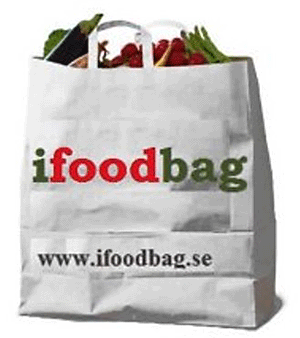Intelligent Paper Bag Reduces Need for Additives in Food
![]() Print this Article | Send to Colleague
Print this Article | Send to Colleague
 Together with the research institute Innventia, Stockholm, Sweden, ifoodbag—a spin-off from the KTH Royal Institute of Technology in Sweden—is developing a food bag made of paper that can refrigerate and freeze provisions for up to 24 hr. The concept entails simpler and cheaper transport of refrigerated goods, less food waste, increased quality of foodstuffs, and less need for additives.
Together with the research institute Innventia, Stockholm, Sweden, ifoodbag—a spin-off from the KTH Royal Institute of Technology in Sweden—is developing a food bag made of paper that can refrigerate and freeze provisions for up to 24 hr. The concept entails simpler and cheaper transport of refrigerated goods, less food waste, increased quality of foodstuffs, and less need for additives.
The food industry is subject to stiff competition and delivering profitability has become increasingly difficult, Innventia notes. This has led to an enormous range of different goods and products with the aim of maximizing sales and profit margins, in turn complicating the delivery chain. Pressure on food prices, and the complex delivery chain that places high demands on sustainability, has led to a situation today where the majority of provisions contain additives, for example preservatives and stabilizers. Inferior food quality and increased quantities of additives can increase the risk of obesity and other lifestyle diseases. Society, i.e. producers, consumers, and the environment/surrounding world, has a major requirement for cost-effective delivery of high quality foodstuffs and reduced food waste.
The concept that will be developed by ifoodbag and Innventia is a system consisting of a paper carrier bag that can refrigerate and freeze provisions for up to 24 hours. The cost of the bag will be on a par with the cost of conventional paper carrier bags. This system enables all foodstuffs to be maintained at high quality. The system is based on principles of "lean production," i.e., optimal handling of available resources. The benefits of the concept are simplified and thus cheaper distribution of provisions that currently require refrigerated transport, less food waste, and thereby reduced environmental impact and reduced costs, as well as ultimately increased quality of, and less need for, additives in the food products that reach the end consumer.
"Studies indicate an ever increasing demand for intelligent packaging. The paper industry is very well placed to play an important role here," said Torgny Persson, VP of Business Area Material Processes at Innventia.
"We are convinced that this can be the next big packaging innovation within provisions," added Karl Fallgren, CEO at ifoodbag.



